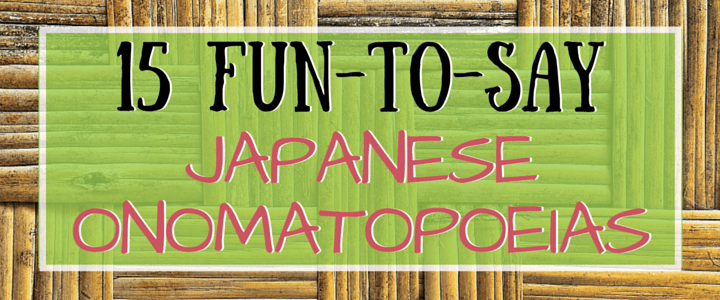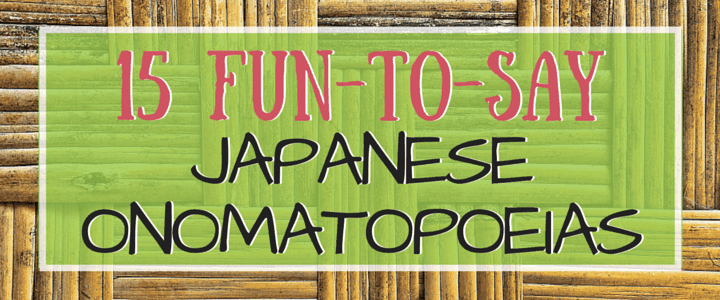
What Are Japanese Onomatopoeia?
An onomatopoeia is a word where meaning is derived from a sound, or when a word sounds like how it looks. In English, we have onomatopoeias like “cock-a-doodle-doo” for the sound a rooster makes, or “crunch” for the act of crushing things.
Onomatopoeias are quite common in many, if not all languages. We tend to notice them most in comics as sound effects: zippers “zip” and light switches “click.” They’re fun to say and they certainly aren’t hard to learn.
Certain Asian languages, like Chinese and Japanese, show emphasis through repetition of a word. This emphasis is usually applied when it comes to onomatopoeias.
The Onomatopoeias
Let’s start off with a list of Japanese onomatopoeia that anyone who watches anime or reads manga is sure to be intimately familiar with…
dokidoki どきどき/ドキドキ
what does dokidoki mean in Japanese? The sound of a small throbbing, dokidoki is most often used to identify a beating heart – typically one that is beating unusually fast or hard. It’s often used to signal sexual tension to the reader of a manga. Dokidoki-suru can be used to infer being excited, nervous, anticipatory, or embarrassed. Actually, saying dokidoki-suru would translate to “I’m nervous,” or, “You make my heart race.”
perapera ぺらぺら/ペラペラ
The sound of something flapping in the wind, perapera is often used to describe incessant chatter. Perapera-suru could be used to tell someone that they should take a breath. But perapera can also be used for good; suggesting that someone flaps their gums in a language would describe them as fluent.
jii じー/ジー
One of the more unique onomatopoeias in Japanese, jii is the sound of staring and motionlessness. The longer the vowel is extended, the more intense the stare. When used as a verb with suru, jii becomes jitto-suru (じっとする). This “to” is a quotation marker and it’s sometimes seen accompanying onomatopoeias in Japanese.
kirakira きらきら/キラキラ
“Twinkle, twinkle, little star…” Most of us know that nursery rhyme. Kirakira is like that “twinkle twinkle.” It’s the sound of sparkling, whether it’s water, gemstones, or stars. Kirakira-suru could be used to let a friend know that the rock you found might just be a diamond.
zaazaa ざあざあ/ザアザア
We don’t really have a word for this in English, but I think it’s fantastic! Zaazaa is the sound of rain falling, or the sound of static on your television screen. This isn’t one you would use too much in ordinary conversation, but it could be used adverbially when talking about rain.
shiin しーん/シーン
Another word we don’t have in English, shiin, is the sound of silence. This is an example of the best part of Japanese onomatopoeias: words for sounds that aren’t made by anything! This word can be used with suru to mean “to be silent,” or more commonly with “to-suru,” as seen above with jii, to form the sense of doing something silently.
wakuteka わくてか/ワクテカ
This is one of my personal favorites. It’s actually a two-fer; it comes from the phrase “wakuwaku tekateka.” Let’s break that down: wakuwaku (わくわく/ワクワク) is the sound of trembling – it means to get excited or nervous, and tekateka (てかてか/テカテカ) is the sound of something shiny or gleaming (similar to kirakira, but less “sharp”). Together, you get wakuteka – the jitters. When someone is shivering with excitement and they just can’t keep still, you might comment with wakuteka-suru.
gorogoro ごろごろ/ゴロゴロ
Gorogoro is the sound of something rolling around. It’s great for describing all manners of things, like roly polies, a runaway barrel, a rolling pen, your gymnastic friend, and more! In addition, it can be the sound of a grumbling stomach, or even thunder. If you imagine all three uses, you can start to really hear the similarity in the sounds.
pachipachi ぱちぱち/パチパチ
Snap! It’s the sound of a book clapping closed, or the bubbling pop of a wood fire. It could also be the sound you make when you snap your fingers. Have you heard of pachinko? It’s a pretty popular game in Japan (often used for gambling) and it’s named so because it makes that sound too! This one has a variant, pachin, that’s goes “zing!” – like bullets ricocheting or the sound of a pinball game.
pekopeko ぺこぺこ/ペコペコ
The sound of a grumbling stomach, pekopeko, is more often used by children, but it can be a cute way to say you’re feeling famished! A groaning pekopeko-suru should get you headed toward food in no time (especially after you read the complete guide to sushi).
suu すう/スウ
The sound of sucking, suu, is actually a normal Japanese verb. But… it’s also an onomatopoeia! Whether taking a breath, pulling on a pipe, or slurping up some broth, suu can be used. Keep in mind that unlike the others on this list, you can’t just add suru to suu because it’s a godan verb, not a suru verb!
mogumogu もぐもぐ/モグモグ
Chew chew chew… and not just in the literal sense. You can use mogumogu for munching on your lettuce leaves, but also to indicate mumbling. Don’t forget to chew your words!
zudon ずどん/ズドン
Thud! Bang! Something heavy just hit the ground. Maybe you dropped a box of books or a bowling ball. Either way, you can use zudon to call to mind a decisive slam onto the floor (or table, bench, or what-have-you).
herohero へろへろ/ヘロヘロ
Oh man, am I wiped! I’m completely pooped from writing this article – I would say I’m herohero. If you take a piece of plastic and flap it around, listen to the sound it makes. This word means flimsy, in the sense of utter and total exhaustion. It counts whether it’s mental, physical, or both.
It’s often used in conjunction with 疲れる (つかれる/ツカレル – to be tired) as ヘロヘロに疲れた (へろへろ に つかれた / herohero ni tsukareta – totally wiped out).
nikoniko にこにこ/ニコニコ
We’re at the end of the article, but don’t be sad – put on a smile! Niko is the sound a smile makes. When you put two smiles together and get nikoniko, it has connotations of happiness – doing something with a grin.
You know emojis? Those cute little faces on your phone that are so popular? Did you know that if you’re using an IME (Input Method Editor) to type Japanese, you can get to those by using Japanese onomatopoeia? Try it! Type niko next time you’re writing in Japanese and hit your spacebar.
Learn more onomatopoeias Japanese group classes on TakeLessons Live, or ask a Japanese tutor if you need some extra help!
Related: Japanese Honorifics, Japanese Numbers 1-10, and Common Japanese Greetings
Mac
